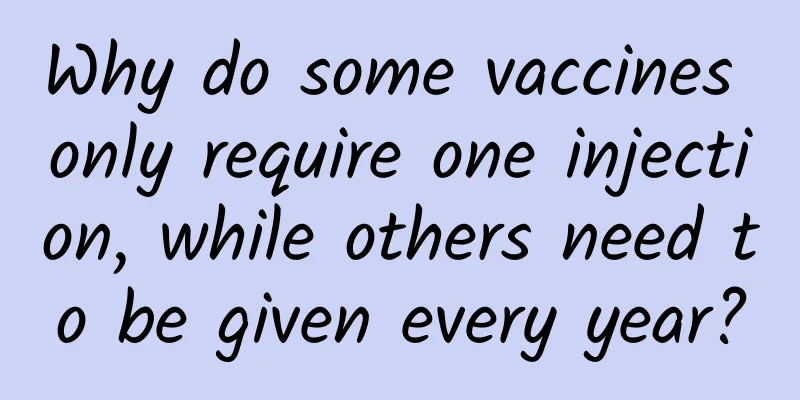Why do some vaccines only require one injection, while others need to be given every year?

|
Some time ago, there were more and more voices about the increase in the incidence of pertussis in 2024. The first reaction of many parents was whether their children had received the DTP vaccine. After reading the vaccine booklet, I found that my child had not only received the DTP vaccine, but also received more than one shot, which made me feel more at ease. Copyright images in the gallery. Reprinting and using them may lead to copyright disputes. But many parents will wonder: Should we continue to give DTP vaccines in the future? Why do we stop giving DTP vaccines after a few shots, while vaccines like influenza need to be given once a year? Are there any particular requirements for the vaccination procedure? Different immunization schedules As we all know, vaccines are an effective means of preventing infectious diseases (and even non-infectious diseases in recent years). After vaccination, the antigens in the vaccine stimulate the human immune system to produce corresponding humoral immunity and/or cellular immunity, thereby resisting specific pathogens. However, the immunization schedule for different vaccines is different. Generally speaking, the immunization schedule for vaccines depends on the following factors: 1 Vaccine type Live vaccines (such as measles vaccine) usually only require 1 to 2 doses to provide long-term protection. Compared with live vaccines, similar inactivated vaccines (such as hepatitis A vaccine and Japanese encephalitis vaccine) may require more doses to achieve similar or better immune effects. Taking the Japanese encephalitis vaccine used in my country as an example, if you choose to receive the free live attenuated Japanese encephalitis vaccine, you need to receive 2 injections, while the inactivated Japanese encephalitis vaccine requires 4 injections. 2 Disease characteristics Some pathogens may mutate, causing the immune response of previously administered vaccines to be reduced or even ineffective. In this case, it may be necessary to regularly or annually administer vaccines prepared with new antigens to deal with the mutated pathogens. Copyright images in the gallery. Reprinting and using them may lead to copyright disputes. For example, influenza viruses may produce new strains every year due to mutations in antigenic proteins. Therefore, influenza vaccines prepared with new strains recommended by the World Health Organization should be administered every year to obtain effective protection. 3 Immunity persistence Some vaccines (such as measles vaccine) provide protection that lasts for many years, while the protection provided by some vaccines (such as whooping cough vaccine) may decrease over time and require booster shots to maintain immunity. Take whooping cough as an example - a study in Zhejiang showed that among the people participating in the study, the positive rate of anti-pertussis toxin antibodies (anti-PT IgG) was the highest in those aged 1 to 2 years (81.44%), and the antibody level dropped rapidly thereafter; it was the lowest in those aged 10 to 14 years (4.72%), and more than 50% of people aged 7 years and above had no detectable antibodies; the positive rate of anti-PT IgG in all age groups of the 5 to 59 age group was less than 10%. At present, there is no pertussis vaccine for people aged 6 years and above in my country. Therefore, after completing the full course of diphtheria, pertussis and tetanus vaccination for children (4 doses), there is no better way to prevent it except to take good protection and maintain a normal immune system. Estimated half-lives of antibodies to measles, mumps, and varicella-zoster viruses. Image source: Reference [3] In contrast, some antibodies can exist for a long time: antibodies produced after vaccination or natural infection with live vaccines including measles, mumps, and chickenpox have an extremely long half-life, so generally speaking, after completing the immunization program or being infected with the relevant virus, "lifelong immunity" can be obtained. Immunization procedures are not set in stone In fact, most live and inactivated vaccines previously required more than one dose because multiple doses can provide high levels of long-lasting protection. However, due to the expansion of evidence of vaccine effectiveness and differences in disease risks among different populations, some multi-dose vaccine immunization programs may also change, or even require only one dose. For example: 1 Human papillomavirus (HPV) vaccine Initially, three doses were recommended, but for children aged 9-14, only two doses are now required; and the latest research has found that even only one dose of HPV vaccine can provide long-lasting and reliable protection against persistent HPV infection. Therefore, the World Health Organization also recommends a one-dose vaccination schedule, and some regions have also changed the HPV vaccine immunization schedule to one dose. 2 Haemophilus influenzae type b (Hib) vaccine Due to the decrease in maternal antibody levels, the prevalence of Hib infection increases rapidly from 4 months of age but begins to decline after 1 year of age - 98.3% of Hib meningitis occurs in children aged 2 to 12 months, and the incidence in 2-year-old children is 1.7%. Therefore, the immunization schedule of Hib vaccine is related to age. The relationship between the incidence of Hib infection-related meningitis and antibody levels and age. Image source: Reference [8] The current Hib vaccine immunization program in my country is: Children who start vaccination at 2 to 5 months old receive 3 doses of basic immunization + 1 dose of booster immunization (3+1 program); Children who start vaccination at 6 to 11 months of age receive 2 doses of primary immunization and 1 dose of booster immunization (2+1 program); A 1-shot procedure is used for children 12 months of age and older. Therefore, the vaccine immunization program is not constant. In addition to considering the pathogen itself, it also takes into account factors such as changes in disease burden and cost-effectiveness. However, the ultimate goal is to effectively fight the disease. Special circumstances requiring revaccination Although some vaccines are sufficient to complete routine immunization procedures, there are inevitably special circumstances that may require revaccination, such as cancer. The newly released "Vaccinations for Adults with Cancer: ASCO Guidelines" recommends vaccines that adult cancer patients need to receive or be revaccinated, including a variety of vaccines that need to be revaccinated. Recommended vaccines for adult cancer patients Image source: Vaccinations for Adult Cancer Patients: ASCO Guidelines For example, patients should begin full revaccination 6-12 months after hematopoietic stem cell transplantation to restore vaccine-induced immunity. Live vaccines should be delayed for at least 2 years and only given in the absence of active graft-versus-host disease (GvHD) or immunosuppression. COVID-19, influenza, and pneumococcal vaccines can be given as early as 3 months after transplantation. Trust in science Timely vaccination Vaccination is crucial for both children and adults. The immunization procedure of vaccines depends on many factors, including the pathogen itself, vaccine technology, health economics, individual factors, etc. Therefore, whether it is a single dose or multiple doses of vaccination, we only need to follow the vaccine instructions or relevant guidelines. It should be noted that although the theme of the 38th "National Children's Vaccination Day" this year is "Joint Action for Vaccination to Escort the Whole Life Cycle", there are still two major problems: 1. The name of the holiday on April 25 is still called "National Child Vaccination Day" instead of "National Immunization Awareness Day"; 2. The vaccination system for the adult population has not yet been established, making it difficult to support protection throughout the life cycle. The current problem facing China is that the optimization space of the child immunization program vaccine system lies in the individual vaccine immunization procedures and vaccine categories, while the adult vaccination system has not yet been established. In addition, although the immunization recommendations for some special groups (such as pregnant women, cancer patients, etc.) have been supported by professional institutions at home and abroad, they are difficult to reach in China due to reasons such as vaccine categories and vaccine awareness. It can be said that there are still many difficulties that need to be resolved in the immunization of relevant groups. In short, vaccination is an effective means of preventing infectious diseases and is of great value to the health of individuals and communities (groups). With the advancement of science, vaccination strategies and management plans are constantly being optimized. For ordinary people, they only need to do eight things: believe in science and get vaccinated in time. Planning and production Author: Shao Yinan, popular science creator Reviewer: Tao Ning, Associate Professor, Institute of Biophysics, Chinese Academy of Sciences Planning丨Fu Sijia Editor: Fu Sijia Proofread by Xu Lailinlin |
<<: Why are my allergy symptoms so severe but cannot be diagnosed?
>>: Make your own matcha bread at home, sweet and soft, kids love it!
Recommend
The breasts are soft and have no elasticity
Some women have soft and inelastic breasts. There...
Are walnuts ripe in July? How to remove the black stain on the handle of walnuts?
Walnuts contain many trace elements and minerals ...
Top 5 female private parts cancer rates
Various gynecological diseases have become common...
What causes abdominal distension after pregnancy?
Women who are pregnant should pay special attenti...
Normal value of the lower edge distance from the uterine os
In fact, natural childbirth has extremely high re...
Do pregnant women have bad tempers?
A woman's body will undergo great changes aft...
Does eating ice cream during pregnancy have any effect on the fetus?
Ice cream is loved by our female friends in daily...
What food is better to eat after abortion?
Abortion has a great impact on women's physic...
Why is the areola large? It is a sign of a woman's physical maturity
When women reach puberty, their areola will becom...
The trial of a bottle of "human albumin"
The trial of a bottle of "human albumin"...
What are the buckwheat related products? What are low glycemic index buckwheat foods?
What are the buckwheat related products? What are...
What to do if a woman has chronic constipation
Many female friends often suffer from constipatio...
The earlier you detect pregnancy, the worse it is.
For women who are preparing for pregnancy, it is ...
How long after ectopic pregnancy can I do salpingography
Any woman of childbearing age has a certain risk ...
What to do if stretch marks itch after childbirth
During pregnancy, stretch marks are very common f...









